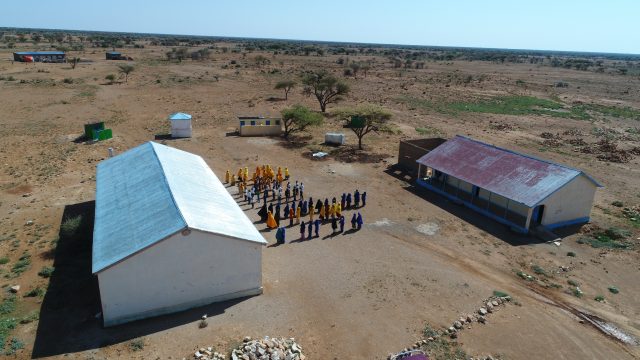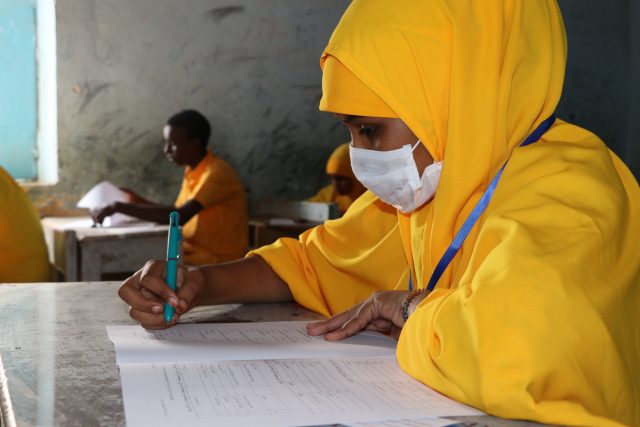We are thrilled to have you on our site. If you enjoy the post you have just found kindly Share it with friends.
MOGADISHU, June 8, 2021 (IPS) – Ten-year-old Sabah Abdi from Ali Issa, a small rural village on the border of Somaliland and Ethiopia, performed well in her final exams, finishing third at her local village school with 400 students.
However, it was only three years ago that Sabah spent her days helping out around the house and herding goats instead of studying because her family of pastoralists could not afford the tuition fees.
“I am very glad that I got into the top three students of the rural school. I hope to become a doctor and cure the sick in the village when I grow up, ”Sabah told IPS.
Drought and food insecurity prevent Somaliland children from attending school
Recurrent droughts, food insecurity, water scarcity, poverty and inequality have hampered efforts to get more Somaliland children into school. Families in this part of Somaliland depend on their livestock for basic food and income, and many of them move from place to place in search of good rain and pasture.
In July 2019, the government of Somaliland, Education cannot wait (ECW) – the United Nations Global Fund for Education in Emergencies and Protracted Crises – and UNICEF in Somaliland launched a multi-year resilience building program to expand access to quality education for children and youth affected by ongoing crises in Somaliland.
IN Somaliland Primary School Net Attendance Ratio estimated at 49 percent for boys and 40 percent for girls. Only 16 percent of internally displaced children and 26 percent of children in rural communities are enrolled in primary schools.
Fully funded, ECW’s $ 64 million three-year education program will reach 198,440 (of which 50% are girls) children by the end of the third year of school, including 21,780 children received support through ECW seed funding. Currently, 18,946 students have benefited from the program, 46 percent of whom are girls. in 69 target schools in six regions. Of these, a significant number of out-of-school 6,342 children (3,074 girls) were enrolled in schools.
In addition, ECW also made two other similar multi-year investments in Puntland and the federal government of Somalia and member states, amounting to $ 60 million and $ 67.5 million, respectively. The three programs are aligned on outcomes and aim to expand access to free education for the most marginalized children and youth, including pastoralist communities.
“The positive impact of ECW’s multi-year investment in Somalia and the tangible changes we and our partners are bringing to the lives of Sabah and many other marginalized girls and boys are moving and inspiring. For the first time, many of these children and youth can learn and develop in a safe, protective and inclusive environment, ”said Yasmin Sheriff, Director of Education, cannot wait. “However, there is still a lot to be done. I call on strategic donor partners to join our efforts and fully fund the three programs. Together we can restore hope for a better future for Somalia’s most vulnerable children and youth. ”

Free training thanks to ECW funding
The primary school that Sabah attends offers free tuition thanks to the support of ECW. This allowed her and other children from this rural community to start learning.
Sabah’s mother, Anab Jama, said she can now keep her children in the village school while her husband travels with the animals in search of fresh food and water. “I stayed to take care of the children at school. I don’t want them to miss out on free education, ”Jama told IPS.
Last year, ECW funding supported the distribution of educational kits by local partners and the Somaliland Ministry of Education during COVID-19 isolation so that children can continue their studies until schools open in late 2020. The kits included books and solar lamps.
“When the pandemic hit Somaliland, we closed the school and sent the children home,” Mohamed Abdi Egal, director of Ali Issse Elementary School, told IPS. “We had no other option to continue teaching students. This was the biggest glitch we’ve seen. When we resumed operations at the end of 2020, we started supporting social distancing and washing our hands. ”
“Education is considered a vital element in community development, but when emergencies such as COVID-19 arise, it shows how it interferes with the provision of basic services, including education,” Egal told IPS.

Training tailored to the needs of pastoralist families
A year after the launch of the 2019 program, the number of children in the pastoral community has increased significantly, from 12 percent to 50 percent due to the structure of the program, said Safiya Jibril Abdi, UNICEF Education Specialist in charge of managing the ECW-funded program. in Somaliland…
“Education always requires long-term planning. In drought-stricken areas, families move and the children also do hard work such as herding animals.When it comes to household chores, girls are the main element of rural families, ”continued Abdi.
“We started our afternoon classes at the beginning of the school year. teachers were hired. When the time of study matched the lifestyle of rural families, it made an impact and became much better for rural children. ”
The program is aimed at children aged 10 and over, as well as those who can successfully complete secondary education in five years within the constraints of their nomadic lifestyle.
Community members in 15 localities in Somaliland have established education committees to ensure the long-term sustainability of education provision here.
“The aim was to improve children’s access to education in a safe environment. In addition, the most important thing is to make the project sustainable for the local community, ”Abdi told IPS. “Girls in school have certain needs, such as the sanitary napkins we give them. This helps teenage girls stay on track during their periods. ”
The UNICEF Education Specialist said the benefits of a collaborative approach, in which various actors, including the Ministry of Education, rural communities and civil society organizations, worked together and with financial support from ECW to provide education for children affected by the crisis, made this initiative a success. …
“It is a sad reality that one in two children in Somaliland does not have access to free education. With the launch of the ECW program, we can now reach these marginalized children, many of whom are in conflict and live in rural areas,” she said.
Meanwhile, Save the Children, an ECW partner based in Puntland, Somalia, has launched several distance learning initiatives, including uploading lessons to the Internet, to help students continue their studies despite isolation from COVID-19.
As a result, 11,052 students, of whom 4,568 were girls, were able to pass the centralized final exams in the 8th grade.
“We have created an ECW online learning program for Puntland elementary schools. Currently, 15,604 students, including 6,924 girls, have access to ECW-supported education in Puntland, ”said IPS Ahmed Mohamed Farah, manager of Save the Children’s ECW Education Consortium in Puntland, Somalia.
As ECW’s executing agency, Save the Children aims to strengthen Puntland’s public education system and improve its quality through dropout monitoring and education management in the four target regions of northeastern Somalia.
Farah said ECW funding also paid for exams for 1,000 students from 51 target schools across Somalia.
“Some students from low-income families and remote areas were unable to register for their national exams in primary school due to registration fees, so we were able to cover their exam fees.
“Six out of 10 high school students were girls. It’s an influence, ”Farah said.
To learn more about Education Can’t Wait for children and youth in extreme and protracted crises, visit: educationcannotwait.org and please follow @EduCannotWait on Twitter.
© Inter Press Service (2021) – All rights reservedOriginal Source: Inter Press Service
Source
https://algulf.net/2021/06/08/education-cannot-wait-investment-will-change-the-lives-of-children-in-somalia-global-challenges/

Deja un comentario